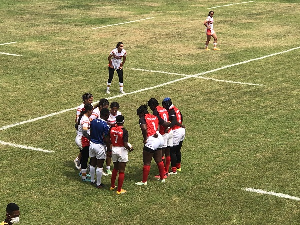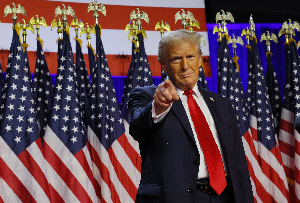Business News of Thursday, 29 January 2015
Source: The Republic
SUBAH SIM box fraud exposé: Telecom, NCA in hot water
The latest exposé by the Subah Info-Solutions of some SIM-box fraudsters intercepting international calls to Ghana has turned the heat on telecom service providers and the National Communication Authority (NCA) and are being fingered for complicity in the multi-million dollars organized crime, the Republic Newspaper has gathered.
Reports available to the Republic Newspaper indicates that some officials of the NCA have been caught on video at the Kotoka International Airport facilitating the import of SIM boxes into the country and negotiating their cuts in the under-the-radar and illegal telecom operations.
This paper has yet been unable to confirm these reports. However, SIM boxes-the equipment used to illegally intercept international calls into Ghana-, are equipment imported through the borders of the country as Information Technology equipment that are required to be inspected and passed by officials of the NCA at the borders. They are supposed to pass a Type Approval test before being let into the country.
Earlier this week, superior tracking technology brought into the country by Subah Info Solutions, saw the arrest of about 6 SIM-box fraudsters including Dr. Alexander Tweneboah, the former President of the Ghana Real Estate Developers’ Association (GREDA) who have collectively pocketed over US$33.6 million in revenues meant for the State.
The Minister of Communications, Dr. Omane Boamah and several other experts in the telecom industry have come to a conclusion that the highly lucrative underground multi-million dollars SIM-box business cannot possibly be perpetrated without active collaborators from the mainstream telecom sector; including possible collaborations from the corridors of the NCA-the telecom regulator.
“We cannot at this stage extricate the chain completely from this (Sim box fraud) because every telecommunication organisation must have the responsibility for every SIM card that is produced for its operations,” Dr. Boamah was quoted earlier this week.
The busted SIM-box fraudsters were in possession of tens of thousands of SIM cards of various telecom networks in Ghana, even though in Ghana, the laws requires that every SIM card sold by telecom companies should be duly registered to the user. These SIM cards cannot be used unless the registration process is done to automatically activate the cards.
It has therefore become inexplicable how single entities in the SIM-box business came to possess thousands of activated unregistered SIM cards per fraudster without the requisite official registration processes.
In the view of the Communications Minister, the chain of relations between service providers and the fraudsters in the acquisition of the SIM cards used by the fraudsters for their criminal operations cannot be overlooked.
In a sharp reaction, KwakuSakyiAddo, the Chief Executive Officer of the Ghana Chamber of Telecommunications-the mouthpiece of the telecom companies-, has denied that that any telecom company is actively involved in SIM box fraud.
Speaking on Citi FM Monday, SakyiAddo said: “I can say on behalf of my members that no network operator is actively participating in this illegal business.”
The rather blamed the lax verification regime of identity cards of Ghanaian residents, saying: “When people buy SIM cards and when they submit ID cards the vendor of the SIM card or network operative agent cannot determine the validity or otherwise of the ID card that the individual is presenting.
“They don’t have any way of verifying whether or not the ID card is an authentic one,” He said adding, “so the problem that we are seeing with regards to identification is a manifestation of a deeper problem and until we solve that it is not peculiar to a network operator.
Sources have told this paper that the recent opposition to the operations of Subah in the country was borne out of fears that the company will expose this illegitimate business being run by some highly influential people in the country.
In 2010, in a bid to plug the huge revenue haemorrhage from the telecom sector, the Ghana Revenue Authority (GRA) contracted SubahInfosolutions Ltd. to electronically monitor revenue generated by the telecom service providers to enable them calculate and collect the right taxes from the companies. The contract was worth $100 million per year.
However, the company came under sharp criticisms when it was alleged that it was being paid by the GRA for no work done. Other criticisms aimed at Subah Info-Solutions was the fact that it did not possess a valid contract to audit the revenue flow of the telecom companies who have been fingered by critics for under-declaring their true income from the Ghanaian telecom market.
In the heat of the Subah controversy, the NCA denied giving domestic revenue monitoring role to any entity, including Subah, for analysis or any other purpose.
According to the NCA, it had only dealt with a Haitian-based company, Global Voice Group (GVG), which had been contracted to fix real time verification equipment on the international gateway systems of the telecommunication companies to monitor incoming international traffic.
But after the recent operations of Subah in collaboration with the Police CID department that is expected to save the country millions of dollars in annual lost revenues from the telecom sector, former hot critics of Subah are back-tracking.
Franklin Cudjoe, the Executive Director of controversial think-tank, IMANI Ghana did a u-turn from his earlier criticisms, saying, “If is the case that they [Subah Info-Solutions] saved Ghana $35m in tax losses, then SUBAH must be examined again and I will do just that.”
















